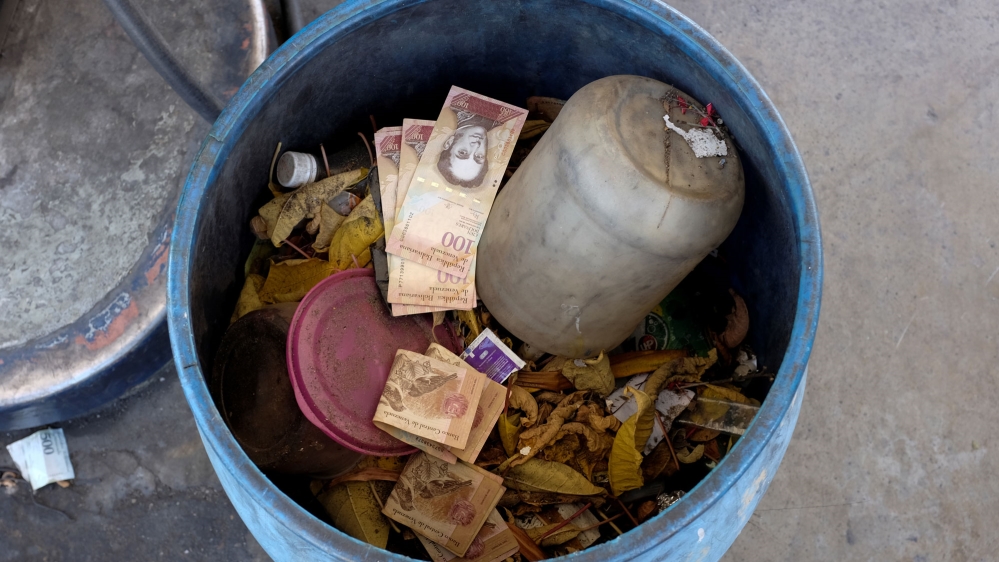Venezuela rolls out new currency amid rampant hyperinflation
Venezuela has rolled out a new currency, slashing five zeroes from the bolivar, in a bid to tame the country’s rampant hyperinflation, but critics say the new measures will only make matters worse.
President Nicolas Maduro declared Monday a national holiday to mark the introduction of a “sovereign bolivar”, part of a raft of financial reforms being pushed through by the embattled leader.
The new bolivar, which will be in circulation alongside the old currency during a transitional period, will be pegged to the country’s state-backed cryptocurrency, the petro.
Each petro will be worth about $60, based on the price of a barrel of Venezuelan oil. In the new currency, that will be 3,600 sovereign bolivars, signaling a massive devaluation.
Al Jazeera’s Alessandro Rampietti, reporting from neighbouring Colombia’s capital, Bogota, said Maduro was betting on the petro bringing some stability to the bolivar.
“But people are very worried because they don’t understand how this currency will actually work,” Rampietti said.
“Many fear that what we will see happening on Tuesday is that prices will continue to go up and this will not make much of a change in a country that is already seeing hyperinflation,” he added.
 |
| Venezuelan 100 bolivar notes thrown by people in a trash bin are seen at a gas station[Marco Bello/Reuters] |
Maria Sanchez, a 39-year-old shopkeeper, told AFP news agency that everyone is “waiting to see what will happen”.
Electronic transactions resumed by midday Monday after being suspended for more than 12 hours.
‘Historic moment’
On Sunday, Maduro called the implementation of the new currency a “historic moment” for the country, with further changes expected to include a more than 3,400 percent minimum wage hike and a rise in the price of fuel.
Beginning September 1, the minimum wage will be fixed at half a petro, 1,800 sovereign bolivars, about $28.
“We need a complete economic revolution, like the one I have already activated and at the centre of it is work, the payment and protection of work,” Maduro said in a video posted on Facebook.
 |
| Venezuela’s President Nicolas Maduro holds a bank note from the new Venezuelan currency Bolivar Soberano (Sovereign Bolivar) [Miraflores Palace handout/Reuters] |
Critics, however, warned the policies could worsen Venezuela’s ongoing economic crisis, with the International Monetary Fund (IMF) predicting inflation could rise to one million percent by the end of 2018.
Venezuela’s opposition, meanwhile, called for a nationwide protest and strike on Tuesday against Maduro’s policies.
“The measures announced are not any economic recovery plan for the country,” opposition politician Andres Velasquez said.
“On the contrary, they represent more hunger, more ruin, more poverty, more suffering, more pain, more inflation, more deterioration of the economy,” he added.
International sanctions
Maduro was re-elected as president in May in an election marred by low turnout, an opposition boycott and allegations from rival candidates of multiple voting irregularities.
Several countries – including those comprising the Lima Group bloc – denounced the vote as illegitimate, while US President Donald Trump passed new sanctions on Venezuela within 24 hours of the election aimed at restricting Maduro’s government from selling off, or borrowing against, public assets.
In June, the European Union also announced tighter sanctions focused on several senior officials in response to the May 20 vote.
Sonia Schott, a Venezuela analyst, said Maduro’s financial reforms were an attempt to energise the country’s ailing economy amid heavy external restrictions.
“He is trying to use the petro cryptocurrency in order to skip these sanctions and try to survive and bring life to the Venezuelan economy,” Schott told Al Jazeera from Washington, DC.
“Of course there are other countries who will be willing to help Venezuela, like China, Russia and probably India, but the rest of the world won’t do that unless they see a political change and a return to democracy in the country,” she added.
Maduro has accused the US and its allies of waging “economic war” on Venezuela, saying the measures imposed by Washington were an attempt to force the country to default on its debt.
Venezuela’s gross domestic product (GDP) has dropped by about 45 percent since Maduro took office in April 2013, according to the IMF.
The UN estimates about 2.3 million Venezuelans have fled the country, which is suffering from chronic shortages of food, medicine and other basic supplies, with the majority departing for Colombia, Ecuador, Brazil and Peru.
While many countries have agreed to take those fleeing economic hardship, Eucador and Peru recently announced that only those with valid passports will be allowed entry at their borders, leaving many Venezuelans with only paper IDs uncertain about their futures.



